CHECK IT OUT! APASWE No. 9 (2013-2015) From President Office June, 2015
Country report from Nepal
By Bala Raju Nikku
Disaster Social Work: Experiences of Nepal School of Social Work
Republic of Nepal struggling to write its own new constitution has been hit by two devasting earthquakes in less than three weeks time, killing thousands, injuring tens of thousands, and leaving millions more with the burden of rebuilding their lives. The Government of Nepal has adopted the National Strategy for Disaster Risk Management 2009 based on Hyogo Framework for Action ( 2005-2015). In addition the Local Self Governance Act 1999 gives local bodies the authority and responsibility to design and implement disaster responses, but ironically no budget is allocated to them. As a result the disaster prevention and awareness work largely carried by the non state actors in colloboration with the government agencies.
April 25 and May 12, 205 EarthQuake Disasters in Nepal
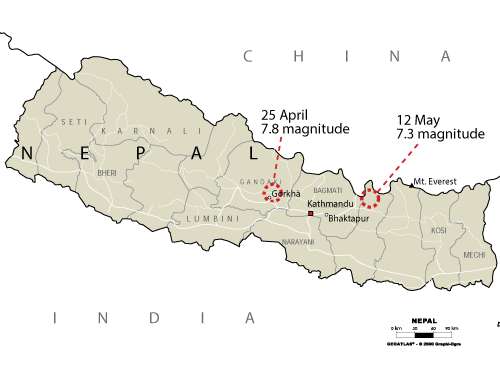 Right in the first week after the disaster struck on 25th April 2015 ( with Gorkha distrcit as epicentre) , NSSW students and faculty came together and with self care responded with relef materials bought on loan and reached Sipapokhari VDC ( 9 wards and about 1000 families in each of the wards) which is out side of the kathmandu valley. On the basis of experience and insights aquired and also the request for support recived NSSW decided to expand its work in other districts also. A virtual helpline for self care of students and faculty has been set up by Prof. Lena Dominelli and her colleagues. NSSW faculty members also got in touch with IASSW, APASWE and IFSW to share and also seek their support to continue their work in disaster affected areas. In thefirst week it self NSSW students and faculty have establised links with local key informants, district development and VDC level officers and most importantly with the police who are involved in the releif and monitoring activities. Fortuantely, many individuals and agencies came in contact with NSSW, visited the campus and held discussion with faculty and students available. In the next few week a lot of developments took place.
Right in the first week after the disaster struck on 25th April 2015 ( with Gorkha distrcit as epicentre) , NSSW students and faculty came together and with self care responded with relef materials bought on loan and reached Sipapokhari VDC ( 9 wards and about 1000 families in each of the wards) which is out side of the kathmandu valley. On the basis of experience and insights aquired and also the request for support recived NSSW decided to expand its work in other districts also. A virtual helpline for self care of students and faculty has been set up by Prof. Lena Dominelli and her colleagues. NSSW faculty members also got in touch with IASSW, APASWE and IFSW to share and also seek their support to continue their work in disaster affected areas. In thefirst week it self NSSW students and faculty have establised links with local key informants, district development and VDC level officers and most importantly with the police who are involved in the releif and monitoring activities. Fortuantely, many individuals and agencies came in contact with NSSW, visited the campus and held discussion with faculty and students available. In the next few week a lot of developments took place.
To share few examples : NSSW graduates are hired by Karina Slovakova, Emergency Field Project Coordinator of the Magna Children at Risk, Nepal after many discussions with Pradipta kadambari, CEO of NSSW. NSSW will be happy to work with Magna further. Similarly, Mercy Malaysia also came in contact with NSSW and discussions are going on to work together. Studnets of NSSW are now assisting Mercy Malaysia in translation during their Psycho social support program in SANKHU ( kathamndu Distrcit). Prof. Jacquleen Joseph of TISS (Tata Institute of Social Sciences) and her colleagues visited NSSW and held discussions with NSSW on areas of colloboration.These discussions have led to further expansion of NSSW work to other places. As of now ( it is going to be one month on May 25 of the mega disaster of Nepal) NSSW students and faculty together with TISS (India) students and faculty have been involved in psycho social support work and data collection in 6 VDCs - village development committees in 3 districts namely: Sindhupalchowk, Kathmandu and Dhadhing.
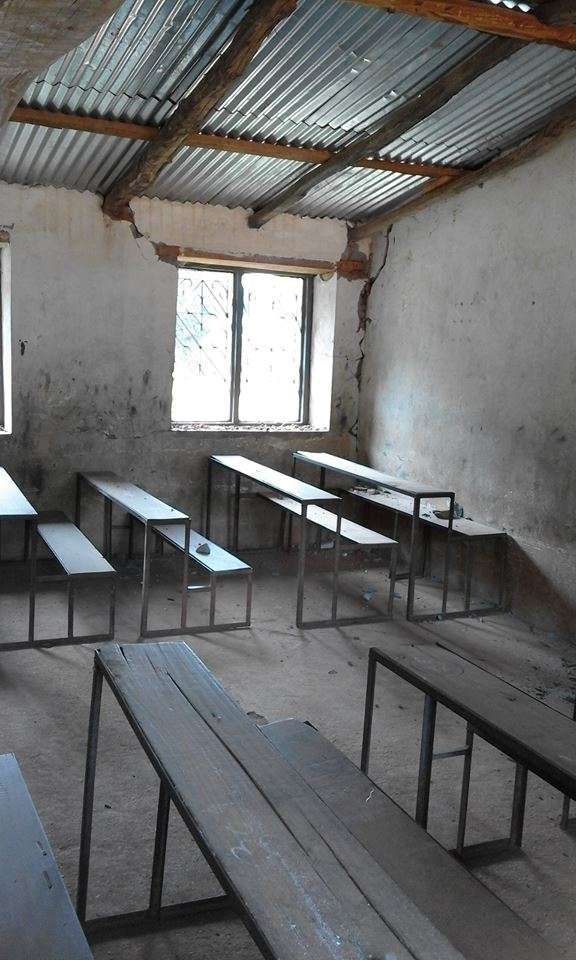 Sindhupalchowk Distrcit ( Bagmati Zone):
Sindhupalchowk Distrcit ( Bagmati Zone):
Three VDCs were selected : SipaPokhare VDC, Bhimtar VDC, BhotaSipa VDC. All three of them are adjoining to each other and heavily damaged, located in hilly area of the district. The distrcit can be roughly divided into two areas: mountains (with elevations of above 3,500 meters) and the more density populated hilly areas. Highest number of deaths are reported from this distrcit.
Kathmandu District ( Bagmati Zone):
Naglebhare VDC, lies on the border with Sindhupalchowk district and is the most backward constituency. As residents seek refuge in outdoor camps throughout the kathmandu city, a temporary shelter landscape has emerged. Areas in red on the map below indicate spaces where camps have been set up.
Dhadhing District ( Bagmati Zone):
Mulpani VDC, Senjong Chautara VDCs are being covered by our team out of 50 VDCs in this district. Each of the selected VDC represernt about 4000 Population ( 800 families on an average in each of these vdcs). Currently NSSW is helping schools in this distrcit also. They are Sri Bhimeswori Madhaymik Vidhyalaya , Bhimtar with white boards and books for grade one to grade 5. We welcome any further support to these schools with resources to rebuild.
Brief Needs Assessment and Psycho Social Support :
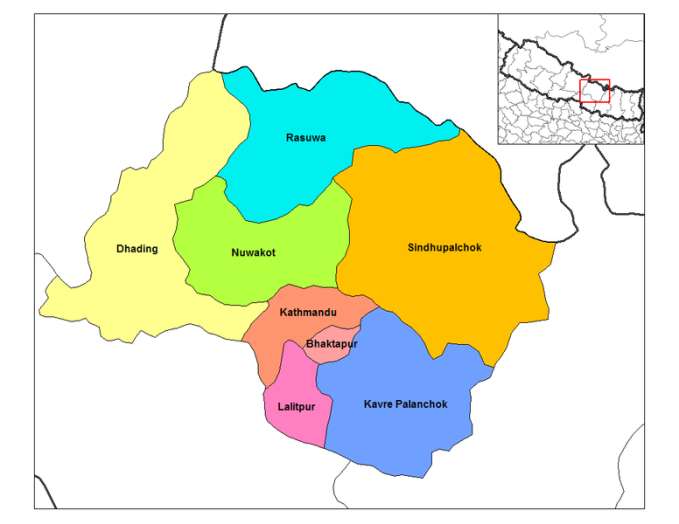 Do no harm is the principle that guided NSSW work in its response to disasters. In Sindhupalchow distrcit ( consisting 68 vdcs and we are working in 3 of them) alone more than 3057 people were dead and 860 are injured and about 3000 people remain unaccounted for. According to district authorities and other reports more than 63,885 houses are severely and 2,751 houses are moderately damaged. Hospitals and health centres have been flattened, and those still standing have numerous cracks making them susceptible to collapse. Air remains the only means of transport to reach mountainous areas where roads have been damaged or blocked. We can imagine the scale of devastation. We will come to know exactly the number of deaths and damage to shelters in the 3 wards that we are working soon.
Do no harm is the principle that guided NSSW work in its response to disasters. In Sindhupalchow distrcit ( consisting 68 vdcs and we are working in 3 of them) alone more than 3057 people were dead and 860 are injured and about 3000 people remain unaccounted for. According to district authorities and other reports more than 63,885 houses are severely and 2,751 houses are moderately damaged. Hospitals and health centres have been flattened, and those still standing have numerous cracks making them susceptible to collapse. Air remains the only means of transport to reach mountainous areas where roads have been damaged or blocked. We can imagine the scale of devastation. We will come to know exactly the number of deaths and damage to shelters in the 3 wards that we are working soon.
By the middle of the June all the 6 teams ( each team about 8 = 6 students and 2 faculty) will be back to kathmandu. By then we shall have the data for about 60,000 ( sixty thousand) families from 6 sites. On this basis we will make evidence based policy recommendations to Government of Nepal and also come up with possible social work interventions to be implemented.
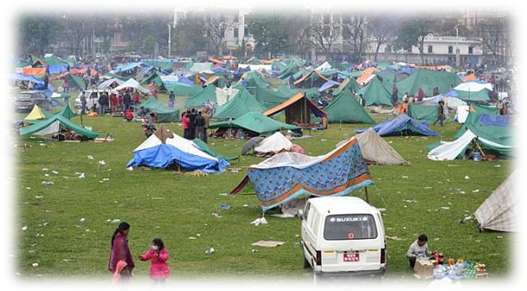 From the direct observations and field visits of the team members, we already knew that shelter is a big issue as many families have lost their homes or partially damaged. Schools, temple and community halls are also damaged. Sanitation and hygene may become a bigger issue once the monsoon sets in early june. Once the monsoon-season starts and people can no longer live outside in tents and make shift arrangements. We need to find quick and appropraite means and ways to help families to live together.
From the direct observations and field visits of the team members, we already knew that shelter is a big issue as many families have lost their homes or partially damaged. Schools, temple and community halls are also damaged. Sanitation and hygene may become a bigger issue once the monsoon sets in early june. Once the monsoon-season starts and people can no longer live outside in tents and make shift arrangements. We need to find quick and appropraite means and ways to help families to live together.
NSSW extends sincere thanks and gratefulness to all social work colleagues all over the globe for their time, counsel, funds mobilisation, and kind support to our efforts on the ground. Ms. Pradipta kadambari, the CEO of NSSW stated that “We are committed to extend further resources of NSSW to work with these communities for the next few months and perhaps years. We do hope that you all continue to be with us and together we shall make a difference to lives of people of Nepal. We are making every effort to increase access to basic needs like shelter and primary care to these families to stand up and regain their strengths”.
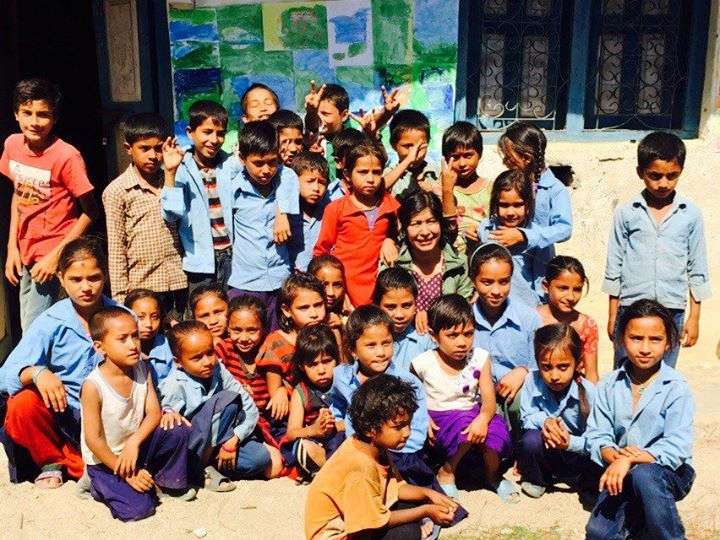 The insights of NSSW and its disaster social work shows that schools of social work despite of limited resources can make a difference to the lives of disaster survivors and communities. NSSW appeals international community of social work to extend further support to continue its long term recovery work in the selected 6 Village Development Committees in Nepal. It believes that this disaster also gave them an opportunity to learn from the communities and working towards integrating disaster social work component in the social work curriculum, teaching and training at NSSW. The fact is the Nepal lies in the seismically active zone and another disaster soon is not a thing of past. As a school of social work, NSSW believes that it is its responsibility to nurture communities to be resilient to disaster and that can happen when the social work students are trained and prepared to work with communities.
The insights of NSSW and its disaster social work shows that schools of social work despite of limited resources can make a difference to the lives of disaster survivors and communities. NSSW appeals international community of social work to extend further support to continue its long term recovery work in the selected 6 Village Development Committees in Nepal. It believes that this disaster also gave them an opportunity to learn from the communities and working towards integrating disaster social work component in the social work curriculum, teaching and training at NSSW. The fact is the Nepal lies in the seismically active zone and another disaster soon is not a thing of past. As a school of social work, NSSW believes that it is its responsibility to nurture communities to be resilient to disaster and that can happen when the social work students are trained and prepared to work with communities.
Please visit our website: www.nepalschoolofsocialwork.org or
Face book: https://www.facebook.com/www.nepalschoolofsocialwork.org
Please support our colleagues fundraising efforts for NSSW: http://www.gofundme.com/nepalsocialwork
- Hits: 2973


